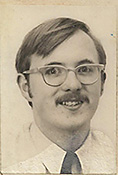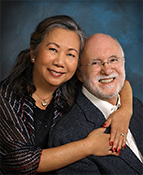Talking with James Beebe (Philippines 1968-73)
In December, James Beebe (Philippines from 1968-73) published his “Peace Corps memoir” Those Were the Days — A Peace Corps Volunteer in the Philippines in the Late ‘60s with Peace Corps Writers. I interviewed James about his impressive accomplishments, and about writing his memoir. — Marian
•
What was your Peace Corp project assignment?
 I was an Education Volunteer — elementary science, rice production, part-time college teaching.
I was an Education Volunteer — elementary science, rice production, part-time college teaching.
.
Tell us about where you lived and worked prior to Peace Corps and your educational background.
I grew up mostly in New Orleans, Louisiana and Panama City, Florida. My education includes:
- before Peace Corps I was a student at Gulf Coast Community College in Panama City, Florida; Tulane University in New Orleans, Louisiana; and New York University;
- after Peace Corps, I was a graduate student at Stanford University where I earned an M.A. in anthropology, an M.A. in Food Research (International Development Agriculture), and a Ph.D. in International Development Education;
- and in 2010 I completed a Masters of Divinity at Meadville Lombard Theological School, the Unitarian-Universalist seminary in Chicago.
As for work, I have been:
- a college teacher at the Monterey Institute for Foreign Studies in Monterey California;
- a planner for a program that served development delayed individuals in Palo Alto, California,
- a Foreign Service Officer working with the Agency for International Development in Sudan, Philippines, Liberia, Oregon State University, Washington DC, and South Africa;
- and for 17 years, a college professor in a Doctoral Program in Leadership Studies at Gonzaga University, Spokane Washington.
.
What are you doing now?
 In May 2013, I retired from Gonzaga University, and my wife, Maria, and I moved to Portland, Oregon where we have appointments as visiting researchers in the anthropology department of Portland State University.
In May 2013, I retired from Gonzaga University, and my wife, Maria, and I moved to Portland, Oregon where we have appointments as visiting researchers in the anthropology department of Portland State University.
In October 2014, I published the second edition of my book Rapid Qualitative Inquiry: A Field Guide to Team-Based Assessment, an applied research method designed to quickly develop an insider’s perspective on and understanding of complicated “on-the-ground” situations.
.
 What prompted you to write Those Were the Days?
What prompted you to write Those Were the Days?
I wanted to share my stories of what has been the most significant time in my life with others, especially my grandchildren.
.
Did you write you book from memory, or did you have a diary, letters, etc. for source material?
I wrote the book from memory. Over the years, I have enjoyed telling many of the stories to others. A few of them required some “fact checking” for dates and context. As I noted in the Preface these events occurred more than forty years ago and “I am the first to confess that my memory is often influenced by optimism and diminished by the passage of time.”
.
Did you participate in a writers’ group while you were working on Those Were the Days?
After we moved to Portland, I joined the Writers Workshop sponsored by the Columbia River Peace Corps Association. Writing the book began with their request to make a five minute presentation based on a sample of what might be in a book. They introduced me to Peace Corps Worldwide and the ability to publish under the Peace Corps Writers imprint. Attending meeting where I knew I would be expected to provide updates provided incentive to preserver.
.
How long did it take for you to write and edit your book?
I worked on the content in spurts of writing, listing possible topics, editing, writing, editing, seeking comments from others, rewriting, etc. over about a 10-month period. For much of that time I was also working on finishing and editing Rapid Qualitative Inquiry: A Field Guide to Team-Based Assessment that was published six weeks prior to the publication of Those Were the Days.
I also worked part-time for about a year doing the interior and cover design in preparation for printing by CreateSpace.
.

Maria and James
You mentioned you had grandchildren — how many children do you have? Did they accompany you during your USAID days? Are they internationalists like you and Maria?
Maria and I have two children who traveled with us and grew up in the Sudan, Philippines, Liberia, Corvallis OR, Washington DC, and South Africa.
Our son has pretty much stayed put in New England after graduating from Wesleyan. He, along with his wife and two children live close to Boston, and after years working in the computer game industry is in the process of getting his teaching certificate and looks forward to teaching.
Our daughter, after graduating from Reed College in Portland where she studied Chinese and finished a degree in Religious Studies, joined the New York City Teaching Fellows program, earned a degree in education from St. John’s College, taught for two years in an inter-city school, and then earned a Masters degree in Asian history from the University of Chicago. She then went to China with Volunteers in Asia. As of early 2015, she has spent more than six years in China, speaks very good Chinese, and in addition to teaching has been involved with a Norwegian Non-Governmental Organization and their program called Orphanages Without Walls.
.
Do you plan to write another academic or non-academic book? or both!
I am working on an exploration of the U.S. foreign assistance policy in South Africa during the transition from the apartheid government to the majority, black led government. I am using an anthropological approach focused on the attempts by different parties to “frame” the debate. I have scars to show from these battles, but will limit my results to the “evidence” from more than 1,000 pages of documents, including the press, government reports and policy papers, congressional hearings, and the results of a Freedom of Information request.
This project is temporarily on hold until I complete a six week, Senior Fulbright Specialist consultancy with the Community Development Center of De La Salle University in the Philippines. The Fulbright grant was awarded about the same time Those Were the Days was published, and about the same time the book Maria had co-edited, about the leadership of global Filipina women, Disrupt was released.
Consistent with the stories in Those Were the Days, I stay very busy.
.
See also “James Beebe publishes Those Were the Days” to read about his “most life-changing event.”
•
Those Were the Days: A Peace Corps Volunteer in the Philippines in the Late ‘60s
by James Beebe (Philippines 1968–73)
Peace Corps Writers
December 2014
162 pages
$14.95 (paperback)
No comments yet.
Add your comment